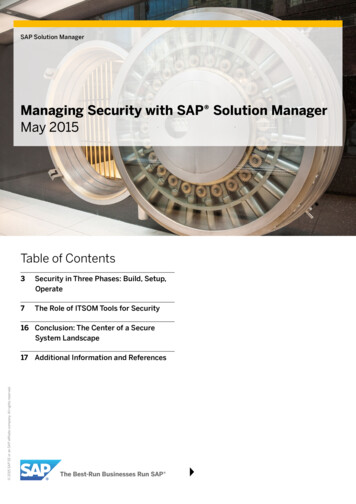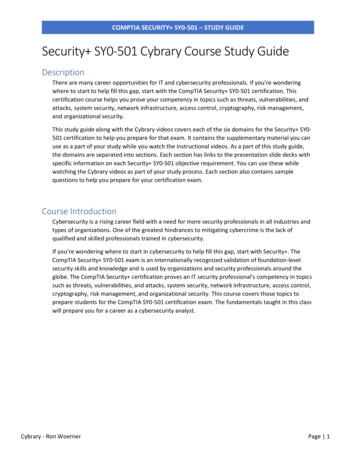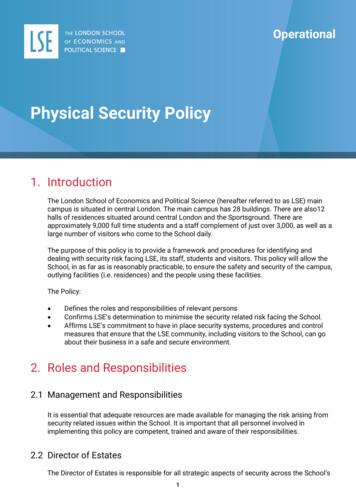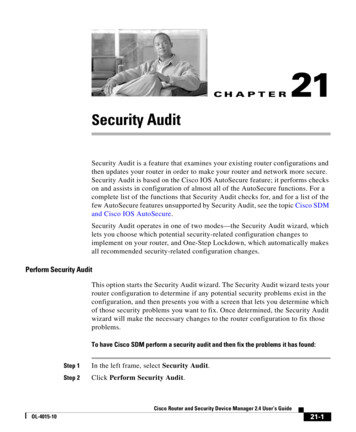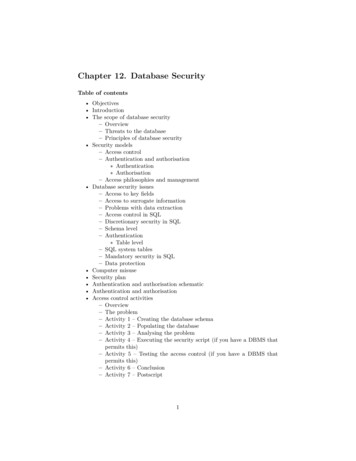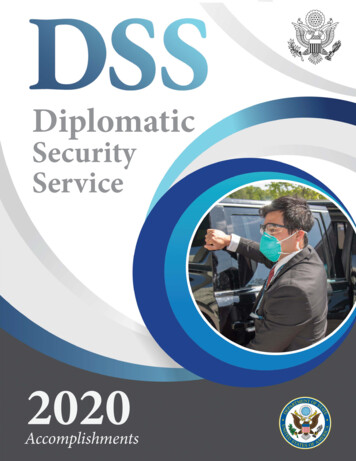
Transcription
DiplomaticSecurityService2020Accomplishments
InvestigateInvestigateIntroductionWherever U.S. diplomats are advancing America's interests, the U.S. Department of State's DiplomaticSecurity Service (DSS) is there, protecting the department's people, facilities, and information. Fromthe streets of San Francisco to the grasslands of Zimbabwe to the temples of Kathmandu, DSS providesa safe environment for the conduct of U.S. foreign policy.Around the world, around the clock, DSS special agents, security engineering officers, securitytechnical specialists, diplomatic couriers, civil servants, contractors, and local staff remain vigilant,protecting U.S. borders and national security.Like the rest of the world, in 2020, the novel coronavirus pandemic forced DSS to find new ways ofworking-telework, enhanced IT services, and more. However, as law enforcement officers, DSS specialagents, and other security personnel had to maintain a secure and physical posture atU.S. Department of State facilities around the world.These law enforcement and security professionals are essential to U.S. diplomacy. Following is a snapshot of 2020 activities that represent the core mission of DSS.
ProtectThe men and women of DSS protect U.S. Department of State facilities, people, andinformation at more than 270 locations in over 170 countries around the world.DSS also protects the U.S. secretary of state, the U.S. ambassador to the UnitedNations, visiting foreign dignitaries, U.S. athletes at international sporting events, andother designated officials.U.S. Secretary of State Michael R. Pompeo departs London, United Kingdom,on July 22, 2020. [U.S. Department of State Photo]The men and women of DSS protect U.S. Department of State facilities, people, and information atmore than 270 locations in over 170 countries around the world. DSS also protects theU.S. secretary of state, the U.S. ambassador to the United Nations, visiting foreign dignitaries, U.S.athletes at international sporting events, and other designated officials.
ProtectAerial view of the Foreign Affairs Security Training Center in Blackstone, Virginia.(U.S. Department of State photo)In 2020, DSS celebrated the one-year anniversary of the official opening of the Foreign Affairs SecurityTraining Center (FASTC) in Blackstone, Virginia. The consolidated training facility provides hardskills training for DSS special agents and other members of the foreign affairs community. Despite thelimitations put in place by the COVID-19 pandemic, FASTC trained approximately 3,200 students andconducted 117 classes in its inaugural year.In February 2020, DSS planned and conductedprotective security operations for U.S. Ambassador to Libya Richard Norland as he met withLibyan National Army Commander GeneralKhalifa Haftar - the first visit by a U.S. ambassador to eastern Libya since the 2012 Benghaziattack. DSS special agents also escorted Norlandduring a June 2020 visit to Western Libya, wherethe ambassador met with Libyan Prime MinisterFayez al-Sarraj.U.S. Ambassador to Libya Richard Norland (middle right) and Commander of U.S.Africa Command, General Stephen Townsend (far right), meet with Libyan PrimeMinister Fayez al-Sarraj (middle left) and Libyan Minister of Interior Fathi Bashagha(far left) on June 22, 2020, in Zuwara, Libya. (U.S. Department of State photo)
ProtectU.S. Ambassador to the Republic of Benin Patricia Mahoney (second from left) andBenin’s Minister of Interior Sacca Lafia (third from left) sign a letter of agreement formally establishing West Africa’s first SPEAR team in a non-high threat country, Cotonou, Benin, Oct. 1, 2020. (U.S. Department of State photo)Benin became the latest nation to partner with DSS as a part of the Special Program for EmbassyAugmentation Response (SPEAR). SPEAR enhances the security of U.S. diplomatic posts in highthreat, high-risk environments by training law enforcement and security personnel in host nations tobetter respond to emergencies at U.S. diplomatic facilities.Read more about the newest SPEAR team: sspear-letter-ofagreement/
ProtectThe State Department’s Insider Threat Program, managed by DSS, educated a record number of employees through its department-wide campaign to highlight National Insider Threat Awareness Monthin September 2020. By the end of 2020, yearly reports were 29 percent higher than last year, provingthat education and outreach have increased employees knowledge of the program.Display of gear issued to and used by DSS special agents, Alexandria, Va., July 2020.(U.S. Department of State photo)In 2020, the Defensive Equipment and Armored Vehicle Division improved its supply chain processdramatically by pairing DSS program managers and financial specialists with contracting officers ofthe State Department's Bureau of Administration. This cut the DSS acquisition timeline by months,allowing DSS to quickly deliver high quality, critical defensive equipment and protective gear tospecial agents and other security personnel worldwide.
ProtectDSS special agents provide security and force protection for the Emergency SupportFunction #9 search and rescue teams that conducted searches after Hurricane Laurahit Louisiana, August 2020. (U.S. Department of State photo)After Hurricane Laura hit Louisiana in August of 2020, DSS special agents supported the FederalEmergency Management Agency’s post-hurricane activities by providing force protection to urbansearch and rescue teams that conducted damage assessments.
SecureDSS provides a safe environment for the conduct of U.S. foreign policy through itstechnical security countermeasures, physical security, and cybersecurity expertise.DSS is a leader in mitigating terrorist threats and other risks to U.S. personnel andfacilities at home and abroad.Special Agent Evan Tsurumi (center, front) helps with a tow strap to remove a burningobstacle during an attack on the U.S. Embassy in Baghdad, Iraq, on Dec. 31, 2019.DSS Special Agent Mike Yohey (back, white shirt, vest) and others examine ways tobarricade an entrance at the U.S. embassy. (U.S. Department of State photo)The DSS regional security office team defended the U.S. Embassy in Baghdad, Iraq, against a violent,coordinated, large-scale attack on Dec. 31, 2019. For over 30 hours well into New Year’s Day 2020violent attackers laid siege to the U.S. embassy compound, throwing Molotov cocktails, rocks, andprojectiles over the walls. DSS special agents held fast, kept their cool, and deployed less-than-lethalmunitions to repel the intruders.
SecureDSS personnel install an indirect fire detection system at that U.S. Embassy inMogadishu, Somalia. (U.S. Department of State photo)In 2020, the DSS Office of Security Technology improved the emergency notification for indirect firedetection at U.S. Embassy in Mogadishu, Somalia. The Sense and Warn Program expanded the Wireless Audio-Visual Emergency System (WAVES) by 20 percent, which allows personnel to be notifiedwhen indirect fire is imminent.
SecureDSS security personnel train explosive detection canines at the Diplomatic SecurityCanine Training and Operations Center, Winchester, Va., Sept. 16, 2020.(U.S. Department of State photo)In 2020, the Diplomatic Security Canine Training and Operations Center (CTOC) improved alignment of services and acquisition of state-of-the-art equipment to ensure preemptive care for canines toprevent illness/injury before they become serious. This change allows for a safe and effective canineprocurement process, provides thorough training, and helps ensure that DSS explosive detectioncanines are highly qualified and operationally effective at some of the most challenging securitylocations around the world.
SecureForeign Emergency Support Team members board an aircraft bound for Lebanon tolend support to the U.S. Embassy in Beirut as part of the U.S. government’s responsefollowing a large explosion at a warehouse in the capital city, Andrews Air ForceBase, Md., Aug. 7, 2020. (U.S. Department of State photo)On Aug. 4, 2020, a massive explosion ripped through the port of Beirut, Lebanon, causing extensiveinjuries and damage throughout the surrounding area. Shortly after the blast, the U.S. Embassy inBeirut requested support from the DSS-led Foreign Emergency Support Team its first operationaldeployment in nearly a decade to help coordinate interagency support for emergency response,restoration of essential services, and public health and safety protection.
SecureA DSS special agent and assistant regional security officer at the U.S. Embassy inBeijing, People’s Republic of China (PRC), with the Marine Security Guard Detachment. (U.S. Department of State photo)U.S. Marine Security Guards have supported the DSS mission overseas for more than 70 years. TheU.S. Department of State and the U.S. Marine Corps reaffirmed the roles and responsibilities of thisrelationship on Oct. 13, 2020, when they signed a new memorandum of agreement.Read more at: https://www.state.gov/usmc moa signing 2020.
SecureDSS regional security office team helps process and board 195 Americans andother passengers for the first evacuation flight out of Wuhan, PRC, Jan. 29, 2020.(U.S. Department of State photo)In January 2020, as the new and highly infectious coronavirus began spreading through People’sRepublic of China (PRC), the local government unexpectedly closed the airport, stopped public transportation, and closed the roadways. U.S. diplomats and other personnel posted at the U.S. ConsulateGeneral in Wuhan were caught in the lockdown, worried about potential inability to access medicalcare and support services, and fearful they might not be able to leave Wuhan. DSS revised itsevacuation plan quickly to help evacuate Americans on the first airlift out of Wuhan. This laid thegroundwork for four additional evacuation flights that brought 600 Americans home by the end ofFebruary 2020.Read more at: .
SecureA DSS special agent stands guard as Americans depart Podgorica, Montenegro,April 28, 2020. (U.S. Department of State photo)From January 27 through June 10, 2020, the U.S. Department of State coordinated the repatriation of101,386 Americans on 1,140 flights from 136 countries and territories. DSS special agents and supportstaff in DSS regional security offices assisted with repatriations from the majority of locations.
SecureU.S. Department of State management officers and DSS diplomatic courier personneltransfer custody of diplomatic pouches from the State Department’s OperationalMedicine support plane at Chinggis Khan International Airport, Ulaanbaatar,Mongolia, April 27, 2020. (U.S. Department of State photo)Partnering with the Directorate of Operational Medicine (Op Med), the DSS Diplomatic CourierService delivered life-saving medical equipment and supplies to dozens of posts around the globe insupport of the department’s COVID-19 response. In January 2020, for example, Mongolia closed itssouthern border with the PRC to insulate the country from a potential outbreak, which led todomestic and international travel restrictions. The closure significantly hindered logistical operationsof the U.S. Embassy in Ulaanbaatar. Op Med and DSS diplomatic couriers collaborated to deliverurgent medical supplies and diplomatic pouches to Ulaanbaatar.
SecureBoxes of personal protective equipment (PPE) and other supplies await shipment tothe department’s global workforce during the early stages of COVID-19. (U.S. Department of State photo)During the early stages of COVID-19, the DSS Countermeasures Directorate leadership initiated plansto provide personal protective equipment (PPE) to its global workforce. The directorate’s Field SupportBranch (FSB) identified the type and amount of equipment needed, and determined the various locations where PPE was required. FSB streamlined its supply chain to track PPE. Given the success of thisinitiative, the State Department’s Bureaus of Management and Acquisition, as well as the DSS TrainingDirectorate, requested FSB’s assistance in obtaining and delivering PPE for the broader workforce.
SecureBefore and after photos of the new Miami Regional Diplomatic Courier Divisionfacility. (U.S. Department of State photo)More than four years in the making, DSS opened its new Miami Regional Diplomatic CourierDivision facility, a state-of-the-art property that maximizes efficiencies by combining the two existingoffices in Fort Lauderdale and Miami. Its proximity to Miami International Airport will improve thecouriers’ ability to transport secure pouches to 40 posts in Central and South America.
SecureThe DSS Office of Antiterrorism Assistance (ATA) trained and equipped hundreds oflaw enforcement officers in partner nations around the world. Below are a fewexamples of the work that ATA-trained officers conducted in 2020.Investigators from the National Police, Joint Bureau for Counterterrorism and Transnational Organized Crime, and the U.S. Embassy Niamey’s regional security officeteam’s senior counterterrorism adviser, arrive near the scene of the October 2020abduction of U.S. citizen Philippe Walton to collect infomation, question nearbyvillagers, and search for evidence.ATA-trained officiers with Niger’s National Police Mobile Border Control Company,the National Guard, and the Special Intervention Group provided Security during aU.S. military operation that freed U.S. citizens Philippe Walton days after he had beenabducted by transnational criminals.
SecureDSS-trained Philippine National Police peacefully resolve a hostage situation at a shopping mall inManila, the Philippines, when a former mall employee wounded a security guard then held approximately 30 people at gunpoint for more than nine hours before being overpowered while he was speaking to news media. Responders include police officers and police hostage negotiators trained by theDSS Office of Antiterrorism Assistance (ATA). (AP/Worldwide Photo)An Afghan officer, trained by the DSS Office of Antiterrorism Assistance (ATA), carries a baby aftergunmen attacked a maternity hospital in Kabul, Afghanistan, on May 12, 2020. A DSS-trained CriticalResponse Unit (CRU) responded to the terrorist attack, which killed 24 people. In a four-hour firefight, ATA-trained and equipped officers killed three terrorists and evacuated more than 100 patientsand staff, including numerous babies. In 2020, CRU teams responded to multiple high-profile terroristattacks and also proactively arrested suspects, disrupted bomb-makers, and rooted out ISIS-affiliatedattackers. (AP/Wide World Photos)
SecureKenya’s President Uhuru Kenyatta waves Kenya’s national flag while accepting adonation of 1.2 million worth of vehicles and equipment provided by the Antiterrorism Assistance (ATA) program in November 2020 at the Kanyonyo Regional TrainingCenter in Kenya. The center, about 75 miles east of Nairobi, is ATA’s newest regionaltraining center, co-located with Kenya’s Border Police Unit Training Campus.(Government of Kenya photo)
SecureThe DSS Cyber Incident Response Team (CIRT) provided continuous cybersecurity protection of U.S.Department of State networks and systems throughout 2020, analyzing over 70,000 security alerts,resolving over 5,500 cybersecurity incident response tickets, and issuing more than 3,000 blocks ofmalicious domains. To align cyber defenses to the expanded use of cloud services, DSS established adedicated cloud monitoring team within CIRT to enhance protections in these emergingenvironments.In 2020, DSS collaborated with the State Department’s IT partners, bureaus, and diplomatic posts toaccelerate delivery of secure telework options. Some of the applications and infrastructure DSS helpedsecure and deliver include databases, remote file download and print options, webcam and headsets,wireless technologies, and others.A DSS cybersecurity professional reviews documents. (U.S. Department of Statephoto)
SecureDSS personnel test communications system before deploying to overseas personnel.(U.S. Department of State photo)In July of 2020, the DSS Project Coordination Division, in collaboration with the DSS Office of theChief Technology Officer, deployed the Residential Security Certified (RSC) online application. RSCsupports regional security officers and residential security managers by providing a streamlined andstandardized process for surveying and certifying residences for occupancy in accordance with theresidential security standards. RSC also serves as the DSS record-keeping application for alloff-embassy compound housing.
InvestigateSecretary of State Robert Lansing created the DSS predecessor organization duringWorld War I to investigate passport and visa fraud, support threat reporting fromoverseas, and gather counterespionage and intelligence information. Today, DSScontinues those investigative endeavors, which help protect the integrity of the U.S.travel documents, support border security, and protect U.S. Department of Stateassets.DSS stock image (U.S. Department of State photo)In 2020, DSS Overseas Criminal Investigations (OCI) Division, conducted nearly 1,500 transnationalcriminal investigations tied to visa and passport fraud. DSS contributed to dismantling internationalhuman smuggling networks and investigated international labor and sex trafficking cases.DSS Investigators also helped facilitate foreign government arrests of visa fraud rings around theglobe. Even during the global pandemic, DSS located and helped return more than 235 fugitives toface charges for crimes such as child exploitation, murder, identity theft, money laundering, and passport fraud.
InvestigatePassports, currency, and identification documents seized by the U.S. Embassy SantoDomingo’s vetted police unit during Operation VIP, Nov. 4, 2020. (U.S. Department ofState photo)On Nov. 4, 2020, the assistant regional security officer-investigator’s vetted police unit at theU.S. Embassy in Santo Domingo, Dominican Republic, led “Operation VIP,” which dismantled adocument fraud ring operating in the Dominican Republic, the United States, and Europe. Dominicanlaw enforcement officers comprised the vetted police unit that worked with other federal law enforcement agencies. Operation VIP led to the arrest of 18 individuals, including airline personnel andDominican immigration and passport officers, who falsified official documents.
InvestigateIn October 2020, DSS and U.S. lawenforcement partners arrested six individuals charged with conspiracy tolaunder millions of dollars of drugproceeds on behalf of foreign cartels. Thearrests were the result of a nearly fouryear investigation into the relationshipbetween foreign drug trafficking organizations and Asian money launderingnetworks in the United States, the PRC,and elsewhere.DSS stock image. (U.S. Department of State photo)Former Maricopa County Assessor Paul Petersen (right), with his attorney, Kurt Altman, leave after a court hearing in Phoenix, Arizona, Nov. 5, 2019.(AP Photo/Jacques Billeaud)On Dec.1, 2020, an investigation led by the DSS Hot Springs Resident Office resulted inPaul Petersen receiving six years in federal prison for smuggling pregnant women from the Republicof the Marshall Islands into the United States for the sole purpose of giving birth an illegal act asoutlined by the Compact of Free Association Agreement between the Marshall Islands and the UnitedStates. Those involved in the illegal smuggling scheme falsified records, including U.S. visa applications, and victimized both the mothers and the unwitting adoptive families.
InvestigateAfter a joint U.S. law enforcement investigation that included DSS, the EasternDistrict of New York charged 10 individuals with transporting stolen property,failure to file export information, andrelated crimes. Those involved in thecriminal network smuggled electronicdevices from the United States to Russiausing couriers, many of whom werecurrent and former employees of Aeroflot Airlines. As a result of the investigation, the U.S. Department of Staterevoked more than 100 visas of Aeroflotemployees.(Shutterstock image)Members of the Boogaloo Movement attend a demonstration against the lockdownover concern about COVID-19 at the State House, April 18, 2020, in Concord, N.H.(AP Photo/Michael Dwyer)On Aug. 3, 2020, the Minneapolis Joint Terrorism Task Force (JTTF) arrested members of theBoogaloo Bois, a loosely organized, extremist political movement in the United States, and its subgroup Boojahideen for attempting to provide material support to a foreign terrorist organization. TheDSS agent assigned to the JTTF was instrumental to the investigation, and in the final phase of theoperation, he led a team that executed multiple search warrants, contributing to the arrest of twomembers of the Boogaloo Bois.
InvestigateA member of the DSS biometrics training team assists a foreign service national investigator with enrolling employees in the Diplomatic Security Identity AssuranceSystem at the U.S. Embassy in Nairobi, Kenya, August 2019.(U.S. Department of State photo)In 2020, the DSS Counterintelligence and Counterterrorism Vetting Division’s (CCV) BiometricsBranch received 4,775 biometric enrollments from 30 posts, identified 19 individuals on the U.S. Department of Defense (DoD) Biometrically Enrolled Watch List (BEWL), and submitted 101 new DoDBEWL nominations. In August 2020, CCV received authorization to deploy its Diplomatic SecurityIdentity Assurance System (DSIAS) worldwide over the next five years in direct support of foreignservice national staff vetting. DSS is implementing the program at higher risk posts first. CCV’sPolygraph Branch conducted a record 22 domestic exams for State Department employees and anadditional 218 exams in Iraq and Afghanistan, for a total of 713 exams in 2020.
InvestigateIn 2019, the DSS Office of Counterintelligence joined the FBI National Counterintelligence Task Force (N CITF) andembedded DSS agents into eight CITFsthroughout the United States. In 2020,the embedded agents continued tosupport the CITF mission by investigating the illegal production, distribution,and use of U.S. or foreign visas and passports to counter espionage objectives byforeign intelligence services. Since theirCITF integration, DSS special agentshave arrested multiple PRC researcherswho have misrepresented their militaryaffiliations on visa applications to accessU.S. industries to commit economicespionage.A DSS special agent (center) supports Operation Savvy Tide, a 45-day campaignin which Counterintelligence Task Force (CITF) agents boarded PRC and Russian-crewed maritime vessels to investigate potential espionage and criminal activityin the Port of San Francisco. (U.S. Department of State photo).A graphic used for the August 2020 DSS Rewards for Justice digital ad campaign,which was part of a multi-agency initiative to secure the November 2020U.S. elections. (U.S. Department of State image)The Office of Rewards for Justice (RFJ) launched a global digital ad campaign on Aug. 5, 2020,announcing a new reward offer of up to 10 million for information on any person working with orfor a foreign government to interfere with U.S. elections through illegal cyber activities. The RFJdigital ad campaign was part of a multi-agency initiative to secure the November 2020 U.S. elections.RFJ deployed social media, video, online ads, text and robo-call messaging, and its website to generateboth tips and significant international news coverage.
InvestigateAn instructor provides Regional Security Office Local Vetting (RESOLVE) training toregional security officers and foreign service national investigators at theInternational Law Enforcement Academy on Dec. 5, 2019, in Bangkok,Thailand.(U.S. Department of State)In 2020, DSS deployed the Regional Security Office Local Vetting (RESOLVE) system, which providesregional security officers and foreign service national investigators (FSNis) a means to efficiently andeffectively conduct standardized background investigations on local staff and locally hired contractorsgranted security certifications at post. Previously, each regional security office used its own process toconduct background investigations. Currently, 170 RSO shops are using RESOLVE.
By the Numbers283 U.S. Diplomatic Posts Overseas33 DSS Offices in U.S. Cities2,059 Special Agents1,950 U.S. Marine Security Guards198 Security Engineering Officers2,148 Domestic Civilian Contractors1,400 Uniformed Protective Officers/Guards884 Civil Servants916 Background Investigators142 Security Technical Specialists43,000 Local Guard Force and Surveillance Detection team personnel91 Diplomatic Couriers139 U.S. Navy SeabeesLast updated February 2021
Canine Training and Operations Center, Winchester, Va., Sept. 16, 2020. (U.S. Department of State photo) In 2020, the Diplomatic Security Canine Training and Operations Center (CTOC) improved align-ment of services and acquisition of state-of-the-art equipment to ensure preemptive care for
